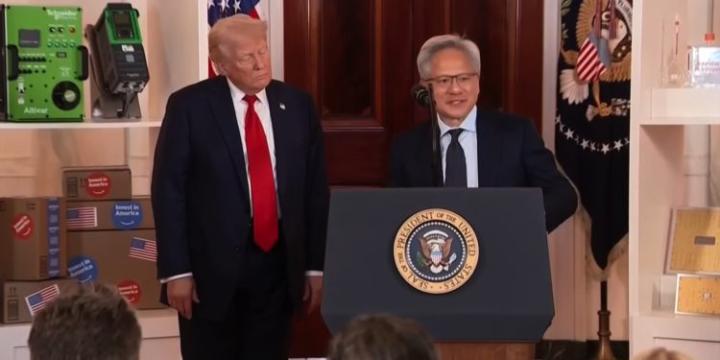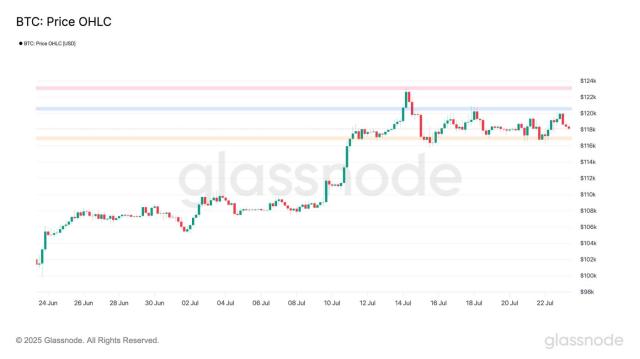If you don't use AI, you will be replaced by those who do,
and we are all quite certain about this.
With lights shining on the stage, NVIDIA CEO Huang Renxun used this unambiguous warning to set the tone for the "Winning the AI Race" symposium in the summer of 2025. From employment to infrastructure, from Trump's policies to chip export bans, Huang broke down complex technologies and geopolitical issues into a readable roadmap, representing both a computing enterprise strategy and the current state of global capital flow.
Huang Renxun Reminds: AI Shows No Mercy to Employment
Facing the age-old question of whether AI will eliminate jobs, Huang pulled the answer to a 100% job transformation. He called AI the "greatest technological equalizer in history," capable of teaching programming and design even to those without a programming background.
Within NVIDIA, every engineer uses AI assistance, and their workload has actually increased. With mundane tasks eliminated, creativity and experimentation have surged. He roughly estimates that AI will automate about half of daily tasks while simultaneously expanding human influence and creating more new job positions. This "enhance, not replace" argument sounds optimistic but is quite impactful.
Huang's conclusion is:
"If you don't use AI, you will be replaced by those who do."
His implication is to urge both businesses and individuals to quickly catch up with AI penetration, or else all professional chains will be reshuffled.
Industrial Imagination of AI Factories
For AI imagination to land, a new type of "AI factory" composed of electricity, data centers, and high-speed networks is needed. Huang estimates this will be a "multi-trillion dollar" market, with the key being NVIDIA GB200 Grace Blackwell superchip: 30 times higher inference performance than the previous generation, with potential for further software-driven acceleration. Through the CUDA ecosystem and vertical integration solutions, NVIDIA is no longer just selling chips but providing an end-to-end platform to enhance customer stickiness.
Huang further introduced the concept of "physical AI": In the future, all industrial companies will simultaneously operate traditional and AI factories, such as Tesla manufacturing cars while using AI models to optimize production lines and vehicle autonomous driving. When all moving objects are connected to AI, existing divisions of labor will be rewritten, and whoever builds data and computing infrastructure first will control the next decade.
Praising Trump, Discussing US-China AI Confrontation
Geopolitics was another conversation line, with Huang unusually praising Trump for "catching the importance of AI and energy on his first day in office," strongly agreeing with Trump's policy tone advocating reindustrialization and high-tech domestic US manufacturing. Huang estimates that in the next four years, the US domestic AI industry can add trillions of dollars in value, emphasizing that "without energy, there is no new industry" and signaling energy hunger.
The US chip export restrictions on China have put the industry at a crossroads. Huang believes a comprehensive export ban would be "counterproductive" and would only accelerate China's self-research. He revealed that he successfully persuaded the Trump administration to allow NVIDIA to sell H20 AI chips to China, maintaining China's dependence on the US technology stack, which is more in line with long-term interests than cutting ties. This "approval" agreement is seen as an adjustment by Washington between economic and national security concerns.
Huang also mentioned the progress of Chinese AI laboratories in open-source models, such as DeepSeek and Kimmy, believing that open-sourcing benefits global innovation and solidifies the US technology stack as a standard. In other words, he hopes to maintain Silicon Valley and Chinese market interdependence through "semi-openness" rather than decoupling, which could help US AI move faster.
AI Talent Requires Capital
The scarcest resource in the AI race might not be chips, but talent. Market rumors of "AI researchers signing contracts worth over $100 million" were not denied by Huang. He candidly admitted to personally reviewing salaries for 42,000 company employees and using machine learning to ensure fairness. He would rather raise wages than lose key engineers, believing that "taking care of employees will naturally lead to success".
In a background of increasingly powerful tools and infrastructure, he believes a 150-person team could potentially achieve OpenAI-level results, posing a challenge to traditional large enterprises. Small teams with massive computing power models are causing capital to chase top individual experts rather than institutions, thereby elevating talent's market value.
From "100% job reshaping" to "trillion-dollar AI factories", Huang encircled the four pillars of the AI era: skills, infrastructure, geopolitics, and talent capital. Trump-era energy policies and reindustrialization visions unexpectedly became fuel for AI hegemony. Limited openness to China shows Washington's softening approach to protecting Silicon Valley's interests.
For every listener of Huang, the question is no longer whether AI will arrive, but how to keep up with the accelerating AI tools.






